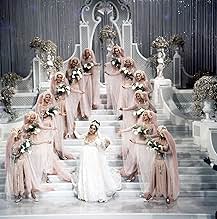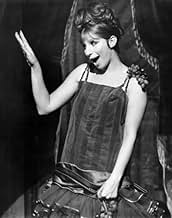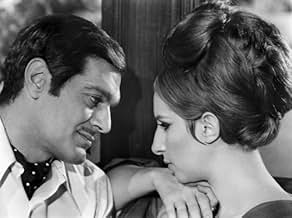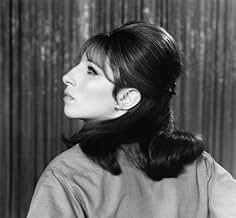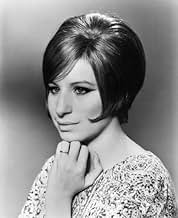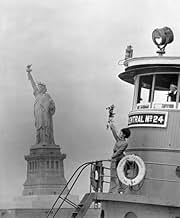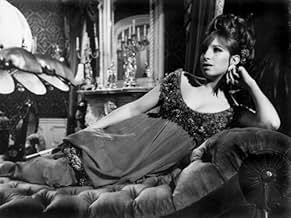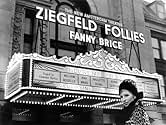VALUTAZIONE IMDb
7,4/10
26.549
LA TUA VALUTAZIONE
Segui la vita di Fanny Brice, famosa comica e intrattenitrice dei primi anni del 1900, la sua ascesa alla fama come ragazza Ziegfeld, la sua successiva carriera e la sua vita personale, in p... Leggi tuttoSegui la vita di Fanny Brice, famosa comica e intrattenitrice dei primi anni del 1900, la sua ascesa alla fama come ragazza Ziegfeld, la sua successiva carriera e la sua vita personale, in particolare il suo rapporto con Nick Arnstein.Segui la vita di Fanny Brice, famosa comica e intrattenitrice dei primi anni del 1900, la sua ascesa alla fama come ragazza Ziegfeld, la sua successiva carriera e la sua vita personale, in particolare il suo rapporto con Nick Arnstein.
- Vincitore di 1 Oscar
- 8 vittorie e 16 candidature totali
Karen Stride
- Ziegfeld Girl
- (as Karen Lee)
Recensioni in evidenza
There are not enough superlatives in the world to bestow on Barbra Streisand for her rags-to-riches portrayal of 20s Ziegfeld Follies star Fanny Brice. To say she gives the single most triumphant musical performance ever showcased on the silver screen could be close. I am constantly bowled over with each viewing at how the 26-year-old Brooklyn novice ever pulled off this incredible stunt. Cinderella playing Cinderella. Even the finicky Hollywood powers-that-be, who NEVER use untried screen talent for such a weighty role (Julie Andrews and "My Fair Lady" come to mind), knew that nobody but Barbra could inhabit this part. She won the Oscar, naturally, and it was befitting that the newcomer should share this honor with perhaps the greatest screen legend ever, Katharine Hepburn.
Barbra's Fanny Brice first conquered Broadway where she lost the Tony award to another irrepressible talent, Carol Channing, for "Hello Dolly!" She got her revenge of sorts years later when she won the coveted screen role of Dolly due strictly to her auspicious debut in "Funny Girl." Transferred to celluloid, the movie loosens its bustles quite a bit and grants more breathing room for Barbra to expand her natural comic and dramatic talents both keenly and intimately amid the elaborate sets and costumes.
The timing of this film couldn't have been better for Streisand. The late 60s ushered in a new legion of stars. The rash of talent coming to the forefront purposely lacked the super-model good looks and incredibly-sculpted physiques of their predecessors. Audiences now clamored for realism...human imperfection. What less attractive guys like Dustin Hoffman and Al Pacino did for the men, Barbra did for the distaff side. She dragged out her own Cinderella version, making a virtue of her odd looks and gawky gait while laying out her two big trump cards -- she was a supreme song stylist and a gifted, self-deprecating cut-up.
Hardly ever off screen, Streisand totally immerses herself in the role of chorus clown-turned-Ziegfeld headliner, weaving a spell around each and every song she touches. From the stubbornly optimistic "I'm the Greatest Star" to the profoundly touching "My Man", the actress matures Brice into the glowing swan of her own dreams, while exposing a deep, personal vulnerability she never recaptured (or allowed) again on screen -- to her detriment.
Despite heavy critical lambasting, I still say exotically handsome Omar Sharif was indeed the consummate choice to play wanderlust husband and card shark Nicky Arnstein. Polished, prideful and totally in his element as the global-gambling playboy, one can believe the ungainly Fanny (or Streisand, for that matter) placing this glossy god on a pedestal. It may not appear to be much of a stretch (in real life, Sharif was a world-class bridge player), but he owns the part as much as delightful Kay Medford does as Brice's droll Jewish mama. Everyone else, however, is pretty expendable. It's been said that Anne Francis blamed Streisand for her supposedly top featured role being butchered. If it's true, she has an open-and-shut case. Francis was left with a nothing part.
Highly fictionalized and weak as biography, Streisand champions above the sometimes grandiose material from the moment she utters her first classic words: "Hello, gorgeous!" And so she is.
Barbra's Fanny Brice first conquered Broadway where she lost the Tony award to another irrepressible talent, Carol Channing, for "Hello Dolly!" She got her revenge of sorts years later when she won the coveted screen role of Dolly due strictly to her auspicious debut in "Funny Girl." Transferred to celluloid, the movie loosens its bustles quite a bit and grants more breathing room for Barbra to expand her natural comic and dramatic talents both keenly and intimately amid the elaborate sets and costumes.
The timing of this film couldn't have been better for Streisand. The late 60s ushered in a new legion of stars. The rash of talent coming to the forefront purposely lacked the super-model good looks and incredibly-sculpted physiques of their predecessors. Audiences now clamored for realism...human imperfection. What less attractive guys like Dustin Hoffman and Al Pacino did for the men, Barbra did for the distaff side. She dragged out her own Cinderella version, making a virtue of her odd looks and gawky gait while laying out her two big trump cards -- she was a supreme song stylist and a gifted, self-deprecating cut-up.
Hardly ever off screen, Streisand totally immerses herself in the role of chorus clown-turned-Ziegfeld headliner, weaving a spell around each and every song she touches. From the stubbornly optimistic "I'm the Greatest Star" to the profoundly touching "My Man", the actress matures Brice into the glowing swan of her own dreams, while exposing a deep, personal vulnerability she never recaptured (or allowed) again on screen -- to her detriment.
Despite heavy critical lambasting, I still say exotically handsome Omar Sharif was indeed the consummate choice to play wanderlust husband and card shark Nicky Arnstein. Polished, prideful and totally in his element as the global-gambling playboy, one can believe the ungainly Fanny (or Streisand, for that matter) placing this glossy god on a pedestal. It may not appear to be much of a stretch (in real life, Sharif was a world-class bridge player), but he owns the part as much as delightful Kay Medford does as Brice's droll Jewish mama. Everyone else, however, is pretty expendable. It's been said that Anne Francis blamed Streisand for her supposedly top featured role being butchered. If it's true, she has an open-and-shut case. Francis was left with a nothing part.
Highly fictionalized and weak as biography, Streisand champions above the sometimes grandiose material from the moment she utters her first classic words: "Hello, gorgeous!" And so she is.
I've decided to purchase all of Omar Sharif's movies of the 60s and have myself an Omar Sharif film festival, thanks mainly to this movie! Sure, Barbra has always been my favorite songbird, and without a doubt, after seeing her here, hello--she deserved that Oscar, hands down. But "it" boy of the 1960s Omar Sharif was just achingly splendid as suave, cultured gentleman and card shark Nick Arnstein. No big stretch for the guy though, who was schooled in French and English schools, in addition to being a professional bridge player and, like Nick Arnstein, also owns racehorses (much later in life, he too almost lost his shirt to gambling). The chemistry between both stars work very well, and the seduction scene was quite funny (what nonchalance indeed, putting beds in restaurants) and and Mr. Sharif could have, should have pursued a singing career with that wonderful voice and patented accent! Rumors were rife that both were having an affair while filming. Barbra, you certainly were on a roll. Note to Omar: I am woman...and YOU'RE THE MAN!
Tour-de-force for Barbra Streisand, reprising her Broadway triumph and taking over the screen as 1930s Ziegfeld singer/comedienne Fanny Brice. Streisand's incredible self-assurance and clowning poise was enough to win her the Best Actress Oscar AND tick off most of Hollywood (few in the business were prepared for someone like Streisand in 1968, except maybe those familiar with her TV work, but the results here show she didn't care what anyone thought of her). The sets look phony, the script is contrived, and Omar Sharif is somewhat miscast as husband Nick Arnstein (Sharif is wonderful in the early stages, but his wet, red eyes and mincing baby-talk grow incredibly weary); however most of the song numbers are fabulous, and Barbra is at her best when delivering a high-powered number. She's tough and unyielding even while doing a comedic bit, but during an emotional song she lets her guard drop a little (not enough to become truly vulnerable, just enough to let us share her pain). The film doesn't exhaust one the way some musical extravaganzas can; the camera-work is uneven and some sequences are overlit, but it has lots of spirit and dazzle. Most importantly, it's a film that remembers it is about a woman and a man, and never allows the show-biz glitter to suffocate the characters. *** from ****
Wow, was Barbra ever great in this one! The delivery of the songs, in which she often gets so intoxicated with the great music and lyrics that she starts swaying. The acting, which certainly is none too bad, either. The sheer beauty of her performance is indescribable. Really, I am not exaggerating. She is radiant in just about every frame of the film that she appears in; she practically glows! She is gorgeous, she really is! You cannot help but love this kid from the moment she steps onto the screen. She is funny, she is touching, she is electric, she is wonderful, and she is so many other things.
Omar Sharif certainly is suave as her leading man (And you know exactly how he feels, because you love her, too!), and Kay Medford is also good as her mother. William Wyler's direction is right on the money. And those costumes and sets! But, of course, the film belongs to Barbra. It may drag quite a bit near the end, but she pulls it through. This was her first film, before the egomania, (evident in only her second film, Hello, Dolly!), before the sappy stuff. This was made when she was a fresh young talent who had "so much to offer." And boy, did she deliver the goods in this one! If you see this, you can certainly consider yourself one of the luckiest people in the world.
Omar Sharif certainly is suave as her leading man (And you know exactly how he feels, because you love her, too!), and Kay Medford is also good as her mother. William Wyler's direction is right on the money. And those costumes and sets! But, of course, the film belongs to Barbra. It may drag quite a bit near the end, but she pulls it through. This was her first film, before the egomania, (evident in only her second film, Hello, Dolly!), before the sappy stuff. This was made when she was a fresh young talent who had "so much to offer." And boy, did she deliver the goods in this one! If you see this, you can certainly consider yourself one of the luckiest people in the world.
I've seen this film many times,and I've always thought it was one of Barbra Streisand's best films because it allowed her to use her strengths as a comedian, singer, and dramatic actor. It's clear that her presence dominates the movie; however, there are some excellent supporting players, including Kay Medford as Fanny Brice's mother Rose and Walter Pigeon as Florenz Ziegfeld, two very fine character actors. Rose is particularly likable because, unlike her daughter Fanny, she sees things as they are and not the way they should be. This applies to her comment about Nick Arnstein, the handsome gambler that Fanny marries, despite the fact that Rose perceives him to be a "sponge."
Fanny, as shown in this film, is also very likable not only because of her humor but for her generosity and thoughtfulness. Her ambition, of course, is to conquer the stage and she does so fairly quickly after making a great mess of a roller skate number at the local dance hall. Before long, Fanny is auditioning for Ziegfeld, the famous impressario and she wins him over with her talent and charm. Nick Arnstein, a man about town, always seems to be around Fanny when she triumphs on the stage and this time is no different. He buys her a beautiful bouquet of roses with a note, "Dear Star, I told you so." Very soon, Fanny and Nick become involved in a relationship which is often on and off until Fanny literally proposes to him. What follows is a heartbreaking story of a young woman whose desire to be loved for herself alone and her passion for a happy domestic life is thwarted by fate and some wrong choices.
After a montage of the first year of their marriage together, problems start affecting the Arnstein marriage. It is true that they are wealthy people; however, their problems aren't minor. Nick begins to lose heavily at the gaming table and everything he tries ends in failure. Fanny, on the other hand, continues to be successful on the stage and Nick starts to resent her. Suddenly, all of his gentlemanly charm and good manners disappear as if by magic; he's rude to Fanny, making her upset over things that a truly married couple would find a way to resolve. Indeed, he starts ignoring her deliberately and places his interests and needs above hers. After a while, the marriage collapses not because of Fanny's career but the way in which Nick looks at their relationship (we discover this near the end of the film.) He also conceals his financial problems from her, shutting Fanny out of his life as though she didn't exist.
All of this culminates in Nick's unfortunate involvement in a shady bond scheme which sends him to prison for two years. I would say that these problems are rather huge. I don't want to give more away because I feel others should have the opportunity to see the film and judge for themselves. But I have to say that the ending of the movie, is, in my opinion, one of the most heartfelt, dignified, and classiest moments ever put on film. And Barbra Streisand makes the most of it, touching us not only with her excellent performance of the song "My Man" but also by the way her Fanny carries herself, taking responsibility for her choice and showing that she will go on with her life, despite what's happened to her.
Fanny, as shown in this film, is also very likable not only because of her humor but for her generosity and thoughtfulness. Her ambition, of course, is to conquer the stage and she does so fairly quickly after making a great mess of a roller skate number at the local dance hall. Before long, Fanny is auditioning for Ziegfeld, the famous impressario and she wins him over with her talent and charm. Nick Arnstein, a man about town, always seems to be around Fanny when she triumphs on the stage and this time is no different. He buys her a beautiful bouquet of roses with a note, "Dear Star, I told you so." Very soon, Fanny and Nick become involved in a relationship which is often on and off until Fanny literally proposes to him. What follows is a heartbreaking story of a young woman whose desire to be loved for herself alone and her passion for a happy domestic life is thwarted by fate and some wrong choices.
After a montage of the first year of their marriage together, problems start affecting the Arnstein marriage. It is true that they are wealthy people; however, their problems aren't minor. Nick begins to lose heavily at the gaming table and everything he tries ends in failure. Fanny, on the other hand, continues to be successful on the stage and Nick starts to resent her. Suddenly, all of his gentlemanly charm and good manners disappear as if by magic; he's rude to Fanny, making her upset over things that a truly married couple would find a way to resolve. Indeed, he starts ignoring her deliberately and places his interests and needs above hers. After a while, the marriage collapses not because of Fanny's career but the way in which Nick looks at their relationship (we discover this near the end of the film.) He also conceals his financial problems from her, shutting Fanny out of his life as though she didn't exist.
All of this culminates in Nick's unfortunate involvement in a shady bond scheme which sends him to prison for two years. I would say that these problems are rather huge. I don't want to give more away because I feel others should have the opportunity to see the film and judge for themselves. But I have to say that the ending of the movie, is, in my opinion, one of the most heartfelt, dignified, and classiest moments ever put on film. And Barbra Streisand makes the most of it, touching us not only with her excellent performance of the song "My Man" but also by the way her Fanny carries herself, taking responsibility for her choice and showing that she will go on with her life, despite what's happened to her.
Lo sapevi?
- QuizWilliam Wyler was asked by a friend whether Barbra Streisand had been hard to work with. He replied, "No, not too hard, considering it was the first movie she ever directed."
- BlooperAfter Nick's release from prison in 1927, he and Fanny did not sadly but amicably part. Instead, Nick rewarded Fanny's years of support by almost immediately starting a series of affairs. Fanny demanded he give her grounds for divorce and even had their children's last name legally changed to Brice. Although he and Fanny would meet again several years later, he never attempted to see his children again.
- Citazioni
Fannie Brice: I'm a bagel on a plate full of onion rolls!
- Versioni alternativeThe original theatrical version included an additional overture before the opening credits, an intermission after "Don't Rain On My Parade," and exit music after the end credits. These additional music pieces have been restored for the DVD release.
- ConnessioniFeatured in This Is Streisand (1968)
I più visti
Accedi per valutare e creare un elenco di titoli salvati per ottenere consigli personalizzati
- How long is Funny Girl?Powered by Alexa
Dettagli
- Data di uscita
- Paese di origine
- Lingua
- Celebre anche come
- Funny Girl: Chica rara
- Luoghi delle riprese
- Jersey Central Railway Station, Jersey City, New Jersey, Stati Uniti('Don't Rain On My Parade' sequence)
- Aziende produttrici
- Vedi altri crediti dell’azienda su IMDbPro
Botteghino
- Budget
- 14.100.000 USD (previsto)
- Lordo Stati Uniti e Canada
- 52.223.306 USD
- Fine settimana di apertura Stati Uniti e Canada
- 65.560 USD
- 3 set 2001
- Lordo in tutto il mondo
- 52.225.786 USD
- Tempo di esecuzione2 ore 31 minuti
- Colore
- Proporzioni
- 2.35 : 1
Contribuisci a questa pagina
Suggerisci una modifica o aggiungi i contenuti mancanti





